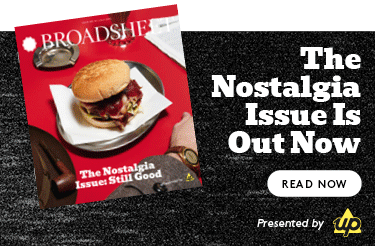I know a couple of small artisan food-makers in Sydney right now who will not exist as you know them in 12 months. This is a fact.
The cost of producing an ethical, artisanal food product in Australia is expensive. And while most industries can simply raise prices to cover the increases in costs of manufacturing, the food industry is another ball game.
Think about the price you’re prepared to pay for a croissant, a meal out, or a litre of milk. There’s a certain pricepoint deemed to be fair, or rather, what the customer is prepared to pay.
Some customers arrive at that pricepoint with their hearts. This isn’t to say that they’re guided solely by emotion, but that they seriously consider all aspects of production. These people ask: is the bakery using quality ingredients? Tick. Is it operating ethically? Tick. Does it have a compelling story? Tick.
Customers who think with their hearts aren’t necessarily wealthy, but they’re enriched by the experience of eating a buttery croissant made by hand with top ingredients, and the knowledge they’re supporting a larger purpose – people and businesses that want to make the best.
Then there’s the customer who thinks – often due to necessity – with their head and their wallet. They’re driven by economics and their priorities around spending. This is understandable given not everyone has the luxury to spend as they please, but there are reasons our croissants cost more than the chain bakeries. Many people figure out what price a croissant should be based on their assumed calculation of its manufacturing costs. That calculation isn’t based on facts – those customers don't really know how a croissant is made, or with what ingredients and how much those ingredients cost.
The fact is a $3 croissant from a supermarket is not the same as a $6 croissant from Flour and Stone. Some people have raised an eyebrow at paying that much, but our recent price increase allows us to give a pay rise to our entire team and to continue to make our products using high-quality ingredients like Pepe Saya butter and Country Valley milk.
Each day I’m confronted with several ways I could (potentially) make shortcuts, either to produce my goods more quickly or more cheaply. But my reluctance to compromise and my desire for longevity gets in the way of those shortcuts.
I could, for instance, use margarine instead of butter and use machines instead of employing people. I could make a cake in a slab and cut it into smart little squares, but instead we line individual rings with foil and silicone paper to mould the cakes, so each person who buys a raspberry buttermilk cake can feel like we’ve made it just for them.
We could have designed an online ordering system and insisted all orders come through that platform, but I believe we need to engage with one another more in this world. So I employ a person to manage orders manually.
The decision to stay small and produce small-batch products is expensive: labour costs more when you’re producing a smaller volume of product and consequently the profit margin is lower. But at Flour and Stone our decision to create things in small batches enables us to maintain consistency and our reputation for quality.
That $6 also covers staff training. I allocate three training shifts a week just on croissants because my team is keen to learn from someone with over 15 years of experience. I’m committed to teaching some of the bakers of the future so when I retire I can still buy an overly buttery croissant.
To stay afloat, artisan producers are peddling like mad to keep their costs down. Like them I choose to continue operating with smaller profits because I’m motivated by the knowledge that I’m making people happy.
We are rewarded by emails from people saying our cake has helped them cope with terminal illness. I once received a text from a friend whose teenage son kissed and made up with his girlfriend talking into the wee hours of the night over our cake.
There is almost no cost I wouldn’t absorb for that satisfaction.
Go and talk to any small producer, engage with them, and ask them why they do it. The cheesemaker, for example, might experience yield anxiety some weeks, worrying there won’t be enough curds. The next week those worries will be about a loss of engagement with their craft because the business is getting too big.
The artisanal tea-maker only uses the best quality organic teas, herbs, and fruits, so the price they need to charge for their handmade product – which must also cover wages and supplier costs – is naturally higher than the mass-produced tea bags you buy in the supermarket. But many people just don’t understand why this is the case.
The farmer rearing cattle for milk will tell you drought is their biggest concern, and that looking after the soil for feed is an important part of sustainable farming that doesn’t happen accidentally – it costs money.
Listen carefully to their stories and their purpose. Be discerning in deciding who to buy from. Make that decision in a considered manner, taking into account all the ways these artisans and producers are contributing to our economy and society at large. Otherwise you risk losing us.
Nadine Ingram is owner of Sydney bakery Flour and Stone and author of cookbook Flour and Stone: Baked for Love, Life and Happiness.





